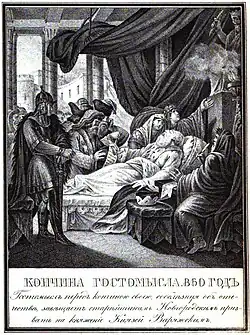Gostomysl

Gostomysl (Russian: Гостомысл, Russian pronunciation: [ɡəstɐˈmɨsl]) was a legendary 9th-century prince or posadnik of Novgorod,[1] who was introduced into Imperial Russian historiography by Vasily Tatishchev (1686–1750).[2]
According to Tatishchev, who claimed to have derived his information from the now-lost Ioachim Chronicle, Gostomysl was elected by the Ilmen Slavs as their supreme ruler and expelled the Varangians from what is now northwestern Russia. But the alleged Ioachim Chronicle is considered by researchers to be the most dubious part of the so-called "Tatishchev information", and widely believed to be a later fabrication, perhaps by Tatishchev himself.[3] The legend of Gostomysl was much aired by the writers and composers working in the nationalist milieu of Catherine II's reign. However, the historians Gerhardt Friedrich Müller and Nikolay Karamzin gave no credit to Tatischev's story, believing that the very name of Gostomysl resulted from a misinterpretation of two Slavic words - gost' ("guest") and mysl' ("thought"). Gostomysl's existence is doubted by virtually every modern historian.[4]
References
- ^ Burbank, Jane; Ransel, David L. (1998). Imperial Russia: new histories for the Empire. Bloomington Indianapolis: Indiana university press. p. 38. ISBN 0253212413.
The eighteenth-century public generally accepted the idea that 'Russia' originated when discordant Slavic tribes summoned Riurik... The dynasts, however, wanted to downplay the foreign origin of Russia's first dynasty... they upgraded Gostomysl'—the legendary last leader of ancient Novgorod—into an internationally renowned prince... They then claimed that his daughter, Queen Umila of Finland, was Riurik's mother; this genealogy resulted in a happy intersection (peresechenie) of bloodline that connected the new dynasty with the family of the last Slavic 'prince.'
- ^ Hesketh, Ian (2012). The Oxford history of historical writing. Oxford: Oxford university press. p. 297. ISBN 9780199219179.
- ^ Tolochko 2005, p. 198.
- ^ Danilevsky, Igor. «Рюрик — это легенда» (in Russian). Русская Планета. Archived from the original on 5 March 2016. Retrieved 12 November 2014.
Bibliography
- Tolochko, Oleksiy Petrovych (2005). "История Российская" Василия Татищева: источники и известия "Istoriia Rossiiskaia" Vasiliia Tatishcheva: istochniki i izvestiia [Vasily Tatishchev's "History of Russia": Sources and Information]. Moscow: Новое литературное обозрение Novoe literaturnoe obozrenie. p. 543. Retrieved 17 May 2023. ISBN 9795867933462 (also published at Krytyka, Kyiv, 2005)